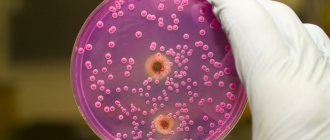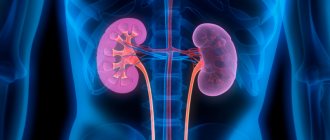Inflammation of the bladder is a common occurrence. Cystitis in women, unlike men, is diagnosed more often. The reason for this is the anatomical features of the structure of the urethra, through which the infection penetrates. With a low urethra, problems begin immediately after prolonged sexual intercourse. Allergies to vaginal deodorants and care products also contribute to the appearance of frequent urges to go to the toilet.
In men, the disease occurs against a background of weakened immunity, chronic sexually transmitted infections, urethral stricture (narrowing of the canal), and prostatitis. If the condition is not corrected in a timely manner, unpleasant symptoms will progress. In addition to pharmacological drugs and treatment with herbal infusions, a special diet is indicated.
With cystitis, the mucous membrane of the bladder becomes inflamed
Can watermelon cause cystitis?
This disease is considered a female disease among urologists, because the fairer sex is affected by it 5 times more than men.
Inflammation of the mucous membrane of the bladder, called cystitis, significantly worsens the quality of life of patients. His treatment must be comprehensive. It is based on diet.
Could it include watermelons? Will the berry harm your well-being during the inflammatory process? Let's look into the issue.
Composition and beneficial properties of watermelon
It has long been no secret that watermelon therapy during the season is a means of flushing the kidneys, and therefore preventing diseases of the genitourinary system. Today's food products often raise doubts about their naturalness.
And synthetic additives often settle in the kidneys, like other harmful substances.
If a person neglects his health and drinks little fluid, then it is likely that substances will accumulate in the kidneys, which over time turn into stones.
The well-known watermelon can resist this. The largest and most accessible berry has long been famous for its cleansing properties. They are based on a diuretic effect. 100 grams of watermelon pulp contains 89 grams of water. It does not linger in the body, removing excess fluid with it.
Watermelon pulp contains iron, a substance that prevents the development of anemia. It also contains magnesium, which is necessary for the normal functioning of the nervous system, blood vessels, heart, and increased stress resistance. Folic acid in watermelon is necessary for the healthy functioning of the digestive organs and brain. It improves hair growth.
Watermelon as a medicine is recommended for those patients who have problems with the urinary system. The berry gently cleanses the body. Its juice removes all toxic substances, toxins, and microbes along with excess liquid.
Cystitis and berry
It is on the diuretic effect of watermelon that its benefits in treating illness are based. In this case, it serves as an adjuvant that speeds up therapy. Urologists advise all patients with cystitis to double their fluid intake so that pathogenic microorganisms that lead to the onset of the disease are more quickly eliminated in the urine.
And if this disease overtakes the patient in the summer, during the watermelon season, then it is necessary to take advantage of the opportunity to speed up therapy.
But there is no need to overdo it, because the berry creates additional stress on the kidneys, increasing the intensity of their work. Like any new seasonal product, watermelon should be introduced into the diet gradually. For example, on the first day of treatment you are allowed to consume 200 grams of watermelon pulp. The next time it may already be 300-400 grams. It is important to listen to your body's reaction.
Urologists often recommend combining the main treatment of cystitis (antibacterial therapy) with the introduction of watermelon into the diet. It will reduce the negative effect of antibiotics on the patient's body.
When it comes to the treatment of chronic cystitis. then the berry should be used as an opportunity to prevent relapses, that is, exacerbations of the disease. Harmful microflora of the bladder will thus be washed out.
As for the time of eating the berry, it is better to do it after meals, eating it as a dessert. Taking into account the diuretic effect of such a product, it is better not to consume it for dinner, otherwise you will have to visit the toilet not only in the evening, but also at night.
Useful foods for cystitis
The disadvantage of watermelon therapy is that it is a seasonal berry. And the disease often develops in the autumn-winter, cold period. Therefore, those foods that are the basis of the diet for illness help in treatment all year round. They should be low in protein.
You can eat fresh vegetables, non-acidic fruits, cereals, and berries without restrictions. This is an excellent opportunity for natural vitamin therapy, because the above products are light, healthy food, rich in vitamins.
It is recommended to include kefir, cottage cheese, fermented baked milk, cereal soups, honey, and olive oil in the menu. Cranberry fruit drinks, lingonberries, which have bactericidal properties, freshly squeezed juices, and green tea help in the treatment of bladder inflammation.
So, nutrition can provoke diseases, or it can become an auxiliary component of therapy. Watermelon is one of those foods that can and should be consumed for cystitis.
Is it possible to eat watermelon with pancreatitis, cholecystitis and cystitis?
Some diseases, such as cholecystitis and pancreatitis, require a strict diet. If it is violated, the condition will worsen. Therefore, before you include foods, vegetables and fruits in your diet, find out whether they can be eaten with this disease.
Today we'll talk about watermelon. In autumn, there is an abundance of vegetables and fruits on store shelves, but watermelon is in first place in popularity. Juicy pulp, unique aroma, price - all this attracts the buyer. But if a healthy person will definitely eat more than one watermelon during the season (up to 2-2.5 kg per day), then a person with diseases needs to weigh the pros and cons.
For pancreatitis and cholecystitis
With pancreatitis, caution is needed, because Watermelon is not a food that will benefit you. Its juice contains not only simple, but also complex carbohydrates, which are undesirable for those who suffer from this disease.
In addition, it contains substances that promote the secretion of bile, which sometimes leads to exacerbation of pancreatitis. Therefore, those who are experiencing an acute form of this disease should not eat it, like other fresh vegetables and fruits. It is advisable to include them in your diet only when thermally processed.
If the disease is no longer in the acute stage, remission has begun, then you can eat watermelon. This berry consists not of glucose, but of fructose, so the body can easily process it.
In addition, watermelon contains beneficial antioxidants that help get rid of inflammation. But you shouldn’t get too carried away either; the daily portion is up to 1.5 kg of watermelon pulp.
It all depends on individual tolerance.
This berry is recommended for cholecystitis. Watermelon contains vitamins and microelements that cleanse the kidneys and liver, remove stagnant bile, etc. therefore, it is useful for cholecystitis, hepatitis, etc. For cholecystitis, it is useful to eat sweet vegetables and fruits, they are part of the diet, and you should not give up watermelon.
Cystitis and striped berry
In case of acute cystitis, doctors recommend drinking a lot. Fruit drinks, water, compotes are healthy, but a piece of fresh watermelon is no worse, even better, because... 100 g of this berry contains 89.5 g of water. This is a diuretic that will not allow urine to linger in the bladder, and therefore will not allow harmful microflora to multiply there.
Watermelon is both a means of preventing cystitis and a medicine. It flushes out bacteria from the bladder that cause the disease. And the metals and vitamins necessary for a person strengthen the immune system, which improves the condition of the body.
Therefore, all doctors recommend eating watermelon both to prevent the disease, both in the initial stage of cystitis and during exacerbation, because it will help remove everything unnecessary from the body.
Beneficial features
Watermelon is a healthy food. What is contained in its juicy, aromatic pulp, and why do doctors recommend it?
- Magnesium. If you eat 150 g of watermelon, the body receives as much magnesium as a person needs per day. Scientists have found that magnesium is involved in 350 body processes. It is necessary for the heart, nervous system, blood vessels.
- Iron. In terms of the amount of iron, watermelon is among the record holders, so it is recommended for those who suffer from anemia.
- Folic acid. We eat this striped berry fresh, so folic acid is not destroyed and enters the human body. It guarantees stress resistance, good brain function, is good for the heart and stomach, promotes hair growth and skin renewal.
- Lots of alkali. Watermelon juice does not contain natural salts and acids, like other vegetables and fruits, but it contains a lot of alkali. Therefore, it is good for the urinary system.
Watermelon cleanses the body; its juice removes toxins from the liver. Therefore, it is recommended to eat it in case of liver diseases or poisoning. It has a beneficial effect after taking potent drugs. If you had to take antibiotics, you should definitely eat this berry, because... the microelements contained in it enhance the effect of drugs and reduce their harmful effects.
Watermelon benefits the body, it is a medicine against such serious diseases as cholecystitis, for example, pancreatitis, and it is indispensable for cystitis. Therefore, during the season, you must definitely eat this berry, filling the body with vitamins and microelements.
Source: https://www.izlechisebya.ru/kak-lechit-cistit/mozhet-li-ot-arbuza-byt-cistit.html
Watermelon for cystitis
Inflammation of the bladder is a common occurrence. Cystitis in women, unlike men, is diagnosed more often.
The reason for this is the anatomical features of the structure of the urethra, through which the infection penetrates. With a low urethra, problems begin immediately after prolonged sexual intercourse.
Allergies to vaginal deodorants and care products also contribute to the appearance of frequent urges to go to the toilet.
In men, the disease occurs against a background of weakened immunity, chronic sexually transmitted infections, urethral stricture (narrowing of the canal), and prostatitis. If the condition is not corrected in a timely manner, unpleasant symptoms will progress. In addition to pharmacological drugs and treatment with herbal infusions, a special diet is indicated.
With cystitis, the mucous membrane of the bladder becomes inflamed
Nutrition for cystitis
In acute and chronic cystitis, the permeability of the bladder walls increases, and pain appears when emptying. To reduce sensitivity and swelling of the walls, it is important to correctly create a menu. Some products have a diuretic effect, others can increase acidity and increase irritation of the intestinal mucosa and bladder walls, while others retain water.
First of all, the following are excluded from the diet:
- peppered;
- salty;
- fried foods.
To timely cleanse the body of feces, the menu includes products with coarse fiber: pumpkin seeds, sprouted grains, whole grain porridge, which stimulate intestinal motility.
Vegetables and fruits, fruit drinks from cranberries, lingonberries, and green tea are useful. However, it is better to remove garlic, sour berries, sorrel, tomatoes, and radishes from the diet. Cucumbers, pears, and melons are useful.
Watermelon for cystitis is the first remedy for removing fluid from the body, and not only the pulp is used, but also the rinds.
Dietary nutrition will help you get rid of cystitis and its symptoms faster
Watermelon or antibiotics?
100 g of pulp contains 90 g of water. It is enough to eat more than 2 kg of healthy berries during the day to rinse the urethra. The benefit of the culture lies in its biochemical composition.
Carotene, zinc, fruit acids, phosphorus, a number of trace elements and vitamins prevent the formation of stones in the ureter, liver ducts, and kidneys. A large piece contains a daily dose of iron, magnesium, and folic acid.
Watermelon is recommended for cholecystitis, bile stasis, gout, arthritis.
- The diuretic effect is provided by the high potassium content. Together with the liquid, E-Koli bacteria and pathogenic microbes leave.
- The body is cleansed of waste products.
When compared with pharmaceutical products, the berry wins in safety, although it is especially useful to eat watermelon during the period of taking antibiotics. Microelements enhance the effect of drugs and minimize the risk of side effects. It is important to adhere to the drinking regime. The daily volume of water is 2.5 liters plus fruit juice.
Watermelon has a pronounced diuretic effect, which allows you to quickly get rid of bacteria and their toxins from the bladder
Contraindications:
- diarrhea;
- acute form of colitis;
- allergy;
- stomach pain.
This type of therapy is not suitable for diabetics due to the high sugar content (up to 13% glucose, fructose). The method is not recommended for pregnant women suffering from edema.
Can berries cause increased symptoms? Since the pulp is recommended at all stages of the disease, it is an indicator of safety. When it comes to treating a chronic disease, juice is used to prevent relapses. With constant lavage of the urethra, pathogenic microbes do not have time to develop. The benefits of watermelon in the treatment of cystitis are obvious.
Everyone will like this medicine.
It is better to replace snacks with berries or eat the prescribed amount in 5-6 approaches. It can be eaten a couple of hours after eating. However, the seasonal product must be gradually introduced into the diet. For the first time, it is better to limit yourself to 300 g of pulp. If there are no reactions, the next day the volume is doubled, then the prescribed dose is used.
It is not advisable to cut and store striped berries in separate pieces in advance, since the biological value is lost. Course – 7 days. When symptoms weaken, treatment continues according to the regimen. To relieve the load on the kidneys, you should refuse the portion after 6 pm. According to the assurances of patients who tested the method, melons cope with cystitis no worse than drugs.
Disadvantages - frequent urge to urinate, the ability to be treated only during the season. But it is not all that bad. The peels are used not only in the form of candied fruits. A teaspoon of crushed dry peel is brewed as tea in winter and drunk before meals. For prevention purposes in the fall, it won’t hurt to go on a watermelon diet for a few days.
Source: https://sochi-mebel.ru/prochee/arbuz-cistite
Briefly about bladder inflammation
The inflammatory process that is localized in the bladder is called cystitis.
People of all ages are susceptible to the disease. However, in women the disease occurs more often and occurs in a more complex form. The disease is characterized by the following manifestations: a sharp onset, pronounced pain symptoms and rapid development of the inflammation process. Symptoms of cystitis in women:
- sharp, cutting pain when urinating;
- frequent urge to go to the toilet with a small amount of urine output;
- drops of blood in urine;
- change in urine color and loss of transparency;
- strong and sudden urge to urinate, possible urinary incontinence;
- general weakness and feverish state;
- increased body temperature with chills.
https://www.youtube.com/watch?v=RxZggD8z6x0
Factors leading to the appearance of cystitis:
- disturbance of urine outflow;
- seasonal decrease in immune parameters;
- long stay in a cold room;
- violation of hygiene standards;
- chronic or acute pyelonephritis;
- pregnancy;
- emotional stress in women.
Inflammation does not occur for one reason. A combination of several factors leads to cystitis: the presence of an infectious agent, weak local immunity in the bladder and a tense emotional state. This set causes a sharp development of the disease, literally in a couple of hours.
Watermelon for cystitis (acute, chronic): is it possible, benefits, contraindications
Watermelon for cystitis can be a good help for patients in treatment with medications.
Due to the high content of useful substances, the pulp of the giant berry has a beneficial effect on the functioning of the urinary system and ensures rapid leaching of pathogenic microorganisms and toxins from the bladder.
The inclusion of watermelons in a therapeutic diet for inflammation, to one degree or another, affects human health, and in order for this effect to be beneficial for the body, you should know several rules for using this product.
Watermelon for cystitis can be a good help for patients in treatment with medications.
Is it possible?
In the absence of contraindications, doctors recommend that patients with cystitis include watermelons in their daily diet. In this case, the berries must be fresh, ripe and grown in conditions safe for human health.
Rules for choosing a product for medicinal purposes:
- the yellow spot of “ripening” should be no more than 5-10 cm;
- a ripe berry floats in the water;
- acceptable watermelon weight is 4-5 kg;
- a fresh product has a pleasant herbal smell, while an overripe product has a sour smell.
The yellow spot of “ripening” should be no more than 5-10 cm.
At the place where berries are sold, permitting documents indicating the date of harvest and marks of quality checks must be available and freely available.
Ostrom
Watermelons can be eaten for acute cystitis. In this case, with the permission of the doctor, the daily norm can be increased to 1.5-2 kg of pulp and juice. The course of treatment is 7 days.
It should be remembered that relief and reduction of general symptoms with a watermelon diet does not eliminate the need to visit a urologist and take medications.
The course of treatment with watermelon is 7 days.
Chronic
For chronic cystitis, drinking watermelon juice is aimed at preventing relapses of the disease. Prolonged rinsing of the urinary tract does not allow pathogenic microflora to multiply and cause exacerbations.
Watermelon is introduced into the diet gradually, starting consumption from 200-300 g. It is advisable to divide the daily intake of the product into 3-4 doses. Gradually, the volume of consumed pulp is increased and brought to the required norm. In case of chronic cystitis and the absence of contraindications, it is allowed to eat up to 1 kg of product per day.
Use as medicine
Since watermelon has a diuretic effect on the body, it is able to flush out pathogenic bacteria that cause inflammation of the bladder.
Rules for using watermelon pulp as medicine:
- the berry must be ripe, without signs of spoilage;
- the daily therapeutic dose of the product is 400-1000 g;
- Watermelon must be eaten separately from other foods; the interval between eating and eating the berry should be 1.5-2 hours.
Watermelon must be eaten separately from other foods; the interval between meals and consumption of the berry should be 1.5-2 hours.
If you have cystitis, it is not recommended to eat watermelon at night. Intensive cleansing of the body and frequent urge to urinate disrupt sleep, which, in turn, weakens the immune system and reduces its protective properties.
In winter, it is recommended to drink tea from dry and crushed watermelon peel, and include raw and fried watermelon seeds in your diet.
When compiling a diet menu that includes watermelons, consultation with a urologist is required.
Contraindications
Contraindications to medicinal consumption of watermelons:
- congenital anomalies of the genitourinary system with impaired urine outflow;
- prostate adenoma;
- cardiovascular diseases;
- the presence of adhesions after surgery during the treatment of diseases of the urinary system;
- pyelonephritis;
- urolithiasis disease;
- atherosclerosis;
- colitis;
- diarrhea;
- ascites;
- allergic reactions.
During pregnancy, you can include watermelon pulp in your diet, but its consumption should not exceed 300 g per day in the first trimester and 200 g in the second and third trimesters.
With caution, the berry is introduced into the diet for pancreatitis, diabetes, and prostatitis.
Source: https://SayDiabetu.net/cistit/polza-arbuza/
Principles of using melons
During treatment or after suffering from cystitis, watermelon fruits should be consumed according to the recommendations of specialists. During this period you will need:
- Eat watermelon as an independent product, separately from various dishes and drinks.
- Keep a 2-hour break between eating regular food and eating watermelon pulp (combining with other products increases the load on the digestive organs and reduces the therapeutic effect).
- Use the juicy product fresh (a watermelon that is cut but not eaten immediately dries out, the vitamins in it are oxidized and lose their valuable properties). Also, you should not eat salted watermelons - this type of product does not have the necessary medicinal properties.
- Avoid eating berries shortly before bedtime (consuming the product late in the evening does not have a therapeutic effect and leads to overload of the kidneys and the entire body). To get the benefits of watermelon, you need to eat it 3 or more hours before your night's rest.
- Take watermelon pulp for food no more than 6-7 times a day, in small portions.
For medicinal purposes, it is recommended to consume about 1.5 kg of watermelon daily. The course of treatment with this melon crop lasts at least one week (by agreement with the doctor, watermelon can be eaten for another 1-3 days).
If the patient has a chronic form of cystitis, a special watermelon diet will be useful, helping to prolong remission and avoid relapse. The essence of dietary nutrition is to consume the aromatic pulp daily and combine it with black bread.
It is recommended to follow this diet for 6-7 days. The result is the removal of sand and small stones from the kidneys and bladder, increasing the body's resistance to infections that cause inflammatory processes in the urinary system.
In addition to antibiotics, watermelon goes well with other remedies for cystitis. It is permissible to combine the berry with anti-inflammatory, analgesic drugs, antispasmodics, medicinal herbs, having first checked this possibility with a doctor.
When planning to use watermelon to treat cystitis, it is necessary to take into account the existing contraindications. The list of such states includes the following states:
- diabetes;
- problems with urine flow;
- BPH;
- ascites (abdominal dropsy);
- stones in the ureters;
- pyelonephritis;
- heart failure;
- pathologies of the pancreas, cholecystitis, colitis in the acute stage
- exposure to frequent diarrhea;
- allergic reactions.
Watermelons are not recommended for children under three years of age. If pregnant women develop cystitis, berries can only be consumed with the permission of a doctor, if the expectant mother does not have edema.
If diseases of the gastrointestinal tract are in remission, the patient can eat watermelon pulp in limited quantities. You will also need to reduce the duration of consumption of the berries from 7 to 2-4 days.
Is it possible to eat watermelon if you have cystitis?
One of the directions in the treatment of cystitis is the use of diuretics. The use of synthetic drugs is allowed.
It is better if the diuretic is used in natural plant form, such a remedy is watermelon.
The effect of watermelon on cystitis
Is it possible to eat watermelon if you have a bladder infection? Yes, you can. If you have cystitis, you need to eat striped berries. This is an analogue of the drugs Lasix or Mannitol.
Forced diuresis will prevent the proliferation of microorganisms in the bacterial form of the disease. In this case, they will be mechanically eliminated from the body.
The presence of useful substances in the juice ensures a speedy recovery. The place is occupied by folic acid, which increases the regenerative properties of tissues.
Provides minimal risk of structural changes in the walls of the bladder.
Eating watermelon for cystitis helps prevent the development of such a serious complication as pyelonephritis.
Increasing urine production prevents the spread of infection within the renal pelvis, which often occurs with disease.
Pyelonephritis requires a serious approach to treatment and can lead to kidney failure.
The advantage of yagola over other diuretics of natural origin, such as rose hips, is that it does not change the acid level of urine.
When treating cystitis, this is important, since a shift to the acidic or alkaline side leads to a negative chemical effect on the inflamed mucous membrane. The berry is rich in B vitamins, which replaces taking vitamin complexes during illness.
The intake of these vitamins, in sufficient quantities, stimulates the immune system, which helps fight the pathogen.
How much watermelon do you eat per day?
The optimal amount of striped berry pulp does not exceed 2.5 kg, since the body may not be able to cope with such a volume of fluid, which will lead to the formation of edema and increased blood pressure.
Watermelon has daily quantity limits. Used as a separate meal.
It is not recommended to eat at the same time as other foods, as this leads to fermentation in the gastrointestinal tract.
Such processes lead to dysbiosis or provoke exacerbation of chronic diseases.
Who shouldn't have watermelon?
In addition to a number of beneficial properties, it also has negative manifestations. The berry has a high glycemic index.
Contraindications for use:
- Disorders of the digestive tract. This applies to pathological processes that are accompanied by vomiting and diarrhea. Symptoms are signs of the action of pathogenic microorganisms, and the juice will become a nutrient medium, which will accelerate reproduction and development.
- Urinary retention. If the absence or retention of urine is caused by an external mechanical factor (if external pressure is applied to the ureter or urethra, this leads to partial or complete narrowing of the lumen), then it is strictly forbidden to eat watermelon. Increased urine production leads to the development of hydronephrosis. With hydronephrosis, urine begins to accumulate not only in the bladder, but also in the renal pelvis, which leads to overdistension and pain. In the absence of surgical treatment, the bladder or kidney ruptures.
- Diseases of the urinary system, which are accompanied by renal failure. If you have kidney failure, you should not eat in large quantities. One slice won't hurt, but more will lead to fluid accumulation and the development of body edema (pastyness).
- Diabetes. The berry has a high glycemic index, which provokes an increase in blood sugar, which will lead to hyperglycemia.
- Age up to 3 years. It is not recommended to give to children under 3 years of age in large quantities. Some watermelons contain nitrates, which lead to severe pathologies in children. It is worth gradually introducing this product into the diet, preferably if it is an environmentally friendly product.
In addition to the listed contraindications, there is a risk of developing allergies. If a person is aware of hypersensitivity to this berry, then contact should be excluded.
Watermelon is a good remedy for cystitis. This is based on its diuretic properties, which has an additional therapeutic effect (accelerates recovery) and is a means of preventing kidney damage.
If used during cystitis, you should consult a doctor. Perhaps the person has other diseases for which use is not recommended.
Source: https://CistitStop.ru/vse-o-cistite/arbuz.html
Choosing the right berries
In order to get the maximum benefit from consuming watermelon pulp, speed up recovery from cystitis or avoid its re-development, you need to choose a ripe, high-quality product. When buying a watermelon you should pay attention to:
- The appearance of the berries. If the stripes of the fruit are dull and the fruit itself does not have an attractive shine, it is better to refrain from purchasing it. Also, you should not buy a watermelon that has damage - in this case, the presence of pathogenic bacteria inside the berry is possible.
- The color of an earthen spot. The area where the watermelon came into contact with the ground while growing should have a reddish, light brown or yellow coloration. A white spot indicates that the fruit is not yet ripe.
- Condition of the stalk. If the watermelon tail is dry, you can be sure that the berry is sufficiently ripe.
- Fruit shape. Compared to oblong specimens, round watermelons are sweeter and more appetizing.
There are also ways to determine the quality of melons. You can verify the naturalness of the fruit:
- dropping a small piece of pulp into a container of clean water (if the liquid has turned red or crimson, the berry probably contains synthetic dyes, and if normal, the water should become cloudy);
- Having carefully examined the peel, the presence of nitrogen salts or other harmful chemicals in the watermelon rind is indicated by the presence of numerous black and brown spots on its surface;
- Having examined the cut product - the natural sugar pulp contains inclusions in the form of grains (if the fruit contains nitrates, its internal contents have an unnatural glossy sheen).
Only if the listed characteristics are present, watermelon with cystitis can be eaten without fear for your own health.
It is recommended to avoid using a product filled with synthetic elements. Such a berry will not have the necessary therapeutic effect, and may even lead to a deterioration in the patient’s well-being and aggravate the course of an unpleasant disease.
Watermelon for cystitis: how is it useful and can you eat it?
Watermelon for cystitis is a means of removing fluid from the body. Both the pulp of the berry and the peel are used for such purposes.
Consumption of melons during the period of inflammation of the bladder - prevention of the development of pyelonephritis. In this case, an obstacle is created for the infection to penetrate into the kidneys.
The berry is allowed to be consumed for acute and chronic pathologies. For chronic disease processes, it is recommended to use juice. It reduces the likelihood of relapse.
Constantly washing the urethra will not allow the proliferation of pathogenic microbes. The diuretic effect for cystitis brings undoubted benefits. Removing toxins from the body is also a merit of watermelon.
Use in the right doses speeds up recovery.
The product is especially useful when cystitis is accompanied by intoxication of the body and high fever. Cleansing itself of waste and toxins, the body is charged with energy, and the person enjoys the process of eating.
For preventive purposes, it is recommended to follow a watermelon diet in the fall; in winter, brew crushed dry peel and drink before meals.
Effect on the body
The basis of the striped berry is water. It is almost 90% in the product. The substances contained in the juice help in the treatment of cystitis.
This melon crop has a unique biochemical composition:
- fruit acids;
- phosphorus;
- carotene;
- zinc;
- iron;
- vitamins;
- microelements.
Thanks to this composition, it is possible to prevent the occurrence of urolithiasis. One large piece of watermelon can saturate the human body in a daily dose:
- magnesium;
- folic acid;
- alkali;
- potassium
Magnesium is involved in many processes, including increasing blood supply to organs and helping to cleanse blood vessels. And this is important in the treatment of cystitis.
Alkalis, which improve the functioning of the urinary system, are very effective in fighting inflammation.
Diuretic properties due to potassium
Folic acid increases tissue regeneration. It helps preserve the walls of the bladder from the appearance of structural changes.
B vitamins, when entering the body in sufficient doses, stimulate the immune system. And this is a great help in the fight against infectious agents.
The naturalness and naturalness of all components that make up watermelon indicate a low probability of allergic reactions as a result of its consumption.
Treatment with watermelon
For treatment to be effective, the product must be used correctly. It is required to gradually introduce it into the diet. Two or three hundred grams is enough to start with. You can double the dose the next day, and then every day increase your intake to the recommended norm.
Watermelon has its own restrictions on daily intake. The optimal amount of pulp to consume is 2.5 kg. It is better to limit the dose to 2 kg per day, otherwise it will be difficult for the body to cope with the processing of a large volume of liquid. As a result, swelling and blood pressure may be higher than normal.
Eating a watermelon in one day is not considered treatment; this is not enough for a course of therapy. A period of time is required - at least a week. Even if there is a feeling of relief and a decrease in symptoms, it is not advisable to stop eating the healthy berry.
The product should not be cut in advance so that the juice does not escape and its value is not lost. It is recommended to take it in portions, in several approaches throughout the day.
The fermentation process in the digestive system can begin when consumed simultaneously with other foods. It is better not to consume this melon culture in the evening to relieve the load on the kidneys.
The last dose is preferable no later than three hours before bedtime.
Advantages
A comparison with antibacterial agents that usually eliminate the disease shows that consuming the berry during the treatment of cystitis is safer. But, if such a situation arises that taking antibiotics is necessary, then eating watermelon is also useful during the period of taking the drugs.
It minimizes the risks of side effects. There are also advantages compared to other diuretics of natural origin - when used, the acidity of urine practically does not change.
And this is an important fact for cystitis, because such changes negatively affect the inflamed mucous membrane of the bladder.










